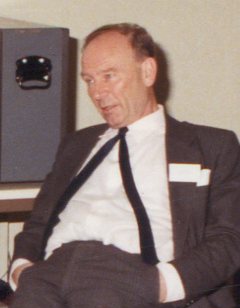Donald Michie facts for kids
Quick facts for kids
Donald Michie
FRSE FBCS
|
|
|---|---|

Michie in 1987
|
|
| Born | 11 November 1923 Rangoon, British Burma
|
| Died | 7 July 2007 (aged 83) North Weald Bassett, England
|
| Nationality | British |
| Education | Rugby School |
| Alma mater | Balliol College, Oxford |
| Known for | Artificial intelligence |
| Spouse(s) | |
| Scientific career | |
| Fields | Artificial intelligence |
| Institutions |
|
| Doctoral students |
|
Donald Michie (born November 11, 1923 – died July 7, 2007) was a clever British scientist. He was a pioneer in a field called artificial intelligence, or AI. During World War II, Michie worked at Bletchley Park. This secret place helped the Allies break enemy codes. He helped solve "Tunny," a German secret code used for messages.
Contents
Early Life and Learning
Donald Michie was born in Rangoon, which is now called Yangon in Myanmar. When he was young, he went to Rugby School. He even won a special scholarship to study old languages at Balliol College, Oxford.
In 1943, during World War II, Donald wanted to help. He tried to join a Japanese language course for intelligence officers. But he found out he was given the wrong information. Instead, he learned about cryptography, which is the science of secret codes. He was very good at it!
Just six weeks later, he was sent to Bletchley Park. This was a top-secret place where codebreakers worked. Donald joined a team called the "Testery." They worked on a German code called "Tunny." While there, he worked with other famous thinkers like Alan Turing.
After the war, from 1945 to 1952, he went back to Balliol College, Oxford. In 1953, he earned his PhD degree. His research was about the genetics of mammals, which are animals like humans and dogs.
Career and Research in AI
Donald Michie was very interested in how machines could learn. In 1960, he created something amazing called Matchbox Educable Noughts And Crosses Engine (MENACE). This was one of the first programs that could learn to play a perfect game of noughts and crosses (also known as Tic-Tac-Toe).
Computers were not common back then. So, Michie built his program using about 304 matchboxes! Each matchbox stood for a different game situation. Inside each box were colored beads. Each color meant a different move. The number of beads of a certain color showed how likely that move was to win. He "trained" MENACE by playing hundreds of games. After each game, he would change the number of beads in the matchboxes. This helped the program learn better moves.
In 1965, Michie became the director of a new department at the University of Edinburgh. It was called the Department of Machine Intelligence and Perception. This department focused on how machines could think and learn. He stayed at Edinburgh until 1985. Then, he left to start The Turing Institute in Glasgow.
Donald Michie kept working on research even when he was in his eighties. In his last ten years, he worked with a charity called The Human Computer Learning Foundation. He also worked with other scientists on systems that could understand human language. He was even writing a book called "Jehovah's Creatures" before he passed away. Michie also invented a clever computer technique called memoisation.
He was also the founder and treasurer of the Human-Computer Learning Foundation, a charity in the UK.
Awards and Honours
Donald Michie received many awards and honors for his important work. Some of them include:
- Fellow of the Royal Society of Edinburgh (FRSE) in 1969.
- Foreign Honorary Member of the American Academy of Arts and Sciences in 2001.
- Corresponding Fellow of the Slovenian Academy of Sciences and Arts in 2005.
- Fellow of the British Computer Society (FBCS) in 1971.
Personal Life and Passing
Donald Michie had four children. Two of his children, Jonathan Michie and Susan Michie, also became successful in their fields.
Sadly, on July 7, 2007, Donald Michie and his former wife, biologist Anne McLaren, were in a car crash. They were traveling from Cambridge to London when their car left the M11 motorway. Both of them passed away in the accident.
Legacy
Donald Michie's important papers and research notes are kept at the British Library. People can look at these papers to learn more about his work in artificial intelligence.
 | Claudette Colvin |
 | Myrlie Evers-Williams |
 | Alberta Odell Jones |

